| Listing 1 - 10 of 44 | << page >> |
Sort by
|
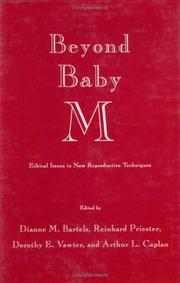
ISBN: 0896031667 Year: 1990 Publisher: Clifton, N.J. Humana Press
Abstract | Keywords | Export | Availability | Bookmark
 Loading...
Loading...Choose an application
- Reference Manager
- EndNote
- RefWorks (Direct export to RefWorks)
Book
ISBN: 1283069555 9786613069559 1400836387 0691148163 9781400836383 9781400824021 1400824028 9780691148168 9781283069557 9780691148168 6613069558 Year: 2010 Publisher: Princeton Princeton University Press
Abstract | Keywords | Export | Availability | Bookmark
 Loading...
Loading...Choose an application
- Reference Manager
- EndNote
- RefWorks (Direct export to RefWorks)
In Enhancing Evolution, leading bioethicist John Harris dismantles objections to genetic engineering, stem-cell research, designer babies, and cloning and makes an ethical case for biotechnology that is both forthright and rigorous. Human enhancement, Harris argues, is a good thing--good morally, good for individuals, good as social policy, and good for a genetic heritage that needs serious improvement. Enhancing Evolution defends biotechnological interventions that could allow us to live longer, healthier, and even happier lives by, for example, providing us with immunity from cancer and HIV/AIDS. Further, Harris champions the possibility of influencing the very course of evolution to give us increased mental and physical powers--from reasoning, concentration, and memory to strength, stamina, and reaction speed. Indeed, he says, it's not only morally defensible to enhance ourselves; in some cases, it's morally obligatory. In a new preface, Harris offers a glimpse at the new science and technology to come, equipping readers with the knowledge to assess the ethics and policy dimensions of future forms of human enhancement.
Genetic engineering -- Moral and ethical aspects. --- Human reproductive technology -- Moral and ethical aspects. --- Biology --- Health & Biological Sciences --- Genetics --- Human genetics --- Genetic engineering --- Moral and ethical aspects. --- Moral and religious aspects --- Human reproductive technology
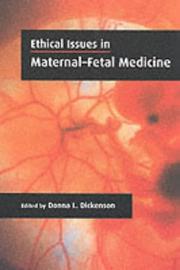
ISBN: 0521664748 9780521664745 Year: 2002 Publisher: Cambridge Cambridge University Press
Abstract | Keywords | Export | Availability | Bookmark
 Loading...
Loading...Choose an application
- Reference Manager
- EndNote
- RefWorks (Direct export to RefWorks)
Human reproductive technology --- Perinatology --- Medical ethics. --- Medical ethics --- Moral and ethical aspects. --- Moral and ethical aspects --- Human reproductive technology - Moral and ethical aspects. --- Perinatology - Moral and ethical aspects. --- Perinatology - Moral and ethical aspects --- General ethics
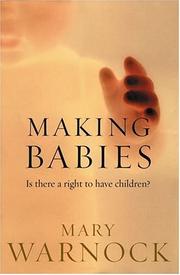
ISBN: 0192803344 0192805002 9780192803344 Year: 2002 Publisher: Oxford Oxford university press
Abstract | Keywords | Export | Availability | Bookmark
 Loading...
Loading...Choose an application
- Reference Manager
- EndNote
- RefWorks (Direct export to RefWorks)
Mary Warnock studies the issues underlying reproductive technologies. She analyses what it means to claim something as a 'right' and discusses the cases of different groups of people. She examines the ethical problems faced by types of assisted reproduction and argues that human cloning may be a viable form of treatment for infertility. The development of new reproductive technologies has raised urgent questions and debates about how and by whom these treatments should be controlled. On the one hand individuals and groups have claimed access to assisted reproduction as a right, and some have also claimed that this access should be available free of charge. As well as clinically infertile heterosexual couples, this right has been claimed by single women, gay couples, post-menopausal women, and couples who wish to delay having children for various reasons. Others have argued that a desire to have children does not make it a human right, and, moreover, that there are some people who should not be assisted to become parents, on grounds of age, sexuality, or lifestyle. Mary Warnock steers a clear path through the web of complex issues underlying these views. She begins by analyzing what it means to claim something as a 'right', and goes on to discuss the cases of different groups of people. She also examines the ethical problems faced by particular types of assisted reproduction, including artificial insemination, in-vitro fertilization, and surrogacy, and argues that in the future human cloning may well be a viable and acceptable form of treatment for some types of infertility.
Reproductive technology --- Human reproductive technology --- Moral and ethical aspects. --- Moral and ethical aspects --- #GBIB:CBMER --- -Human reproductive technology --- -reproductieve technologie (voortplantingstechnologie, medisch begeleide voortplanting, MBV, artificiële voortplanting, kunstmatige voortplanting) --- kinderwens --- Assisted human reproduction --- Assisted conception --- Conception --- Human assisted reproduction --- Human reproduction --- Medical technology --- Assisted reproduction --- Reproduction --- Biotechnology --- technique de reproduction (technique de procréation, procréation médicalement assistée, PMA, assistance médicale à la procréation, AMP, procréation artificielle) --- désir d'enfant --- Technological innovations --- reproductieve technologie (voortplantingstechnologie, medisch begeleide voortplanting, MBV, artificiële voortplanting, kunstmatige voortplanting) --- ART (Assisted reproductive technology) --- Assisted reproductive technology --- Reproductive techniques --- Reproductive technology - Moral and ethical aspects. --- Human reproductive technology - Moral and ethical aspects. --- Human reproductive technology - Moral and ethical aspects
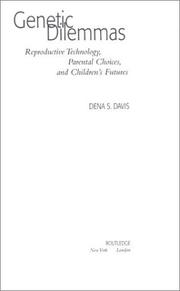
ISBN: 0415924081 041592409X 9780415924092 Year: 2001 Publisher: New York Routledge
Abstract | Keywords | Export | Availability | Bookmark
 Loading...
Loading...Choose an application
- Reference Manager
- EndNote
- RefWorks (Direct export to RefWorks)
In Genetic Dilemmas and the Child's Right to an Open Future, Davis examines perplexing medical cases as a means to discussion of ethical dilemmas raised by the availability of new reproductive technologies. Her discussion covers genetic ethics, as well as the ethics of parenthood. The author advances an ethical theory that can guide health care professionals, policy makers and parents when the rights and interests of parents collide with those of their "potential children" or children. Davis addresses four ethical issues in genetics in Genetic Dilemmas including disabled parents who seek assistance in conceiving a child who shares their disability; genetic testing of children with no immediate medical benefit; sex selection and determination of fetal sex; and the cloning of human beings. (Routledge)
Professional ethics. Deontology --- Genetics --- Human reproductive technology --- Medical genetics --- Procréation médicalement assistée --- Génétique médicale --- Moral and ethical aspects. --- Aspect moral --- Procréation médicalement assistée --- Génétique médicale --- Moral and ethical aspects --- Human reproductive technology - Moral and ethical aspects --- Medical genetics - Moral and ethical aspects
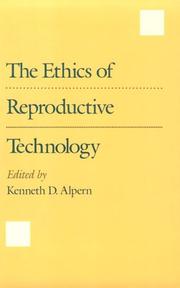
ISBN: 0195074351 9780195074352 Year: 1992 Publisher: New York Oxford Oxford University Press
Abstract | Keywords | Export | Availability | Bookmark
 Loading...
Loading...Choose an application
- Reference Manager
- EndNote
- RefWorks (Direct export to RefWorks)
Human reproductive technology --- Moral and ethical aspects. --- -#GROL:MEDO-173.4 --- Assisted human reproduction --- Assisted conception --- Conception --- Human assisted reproduction --- Human reproduction --- Medical technology --- Reproductive technology --- Moral and ethical aspects --- Technological innovations --- #GROL:MEDO-173.4 --- Human reproductive technology - Moral and ethical aspects.
Book
ISBN: 0192177540 9780192177544 Year: 1992 Publisher: Oxford : Oxford University Press,
Abstract | Keywords | Export | Availability | Bookmark
 Loading...
Loading...Choose an application
- Reference Manager
- EndNote
- RefWorks (Direct export to RefWorks)
Should we engineer changes in human beings? Ought we to use the human organism as a cell or organ bank to provide 'spare parts'? Is it wrong to buy or sell human tissue? Should we experiment on human embryos or children? We are on the brink of a revolution with far reaching implications. The revolution in molecular biology will give us the ability to divert and control human evolution to an unprecedented extent. It will enable us to manufacture new life forms to order, and to make radical changes to human beings and human nature itself. In Wonderwoman and Superman John Harris argues that the decision before us now is not whether to use this power but how and to what extent. To try to ignore or reject the advances in human biotechnology would be futile, and might lead to an immense amount of avoidable suffering. There is no safe path, however, and more positive interventions may also lead to considerable harm. What we must do is learn to choose responsibly, and this important book is about the ethics of the choices that confront us.
Genetic engineering --- Human reproductive technology --- Génie génétique --- Procréation médicalement assistée --- Moral and ethical aspects --- Aspect moral --- Moral and ethical aspects. --- Génie génétique --- Procréation médicalement assistée --- Human reproductive technology - Moral and ethical aspects. --- Genetic engineering - Moral and ethical aspects.
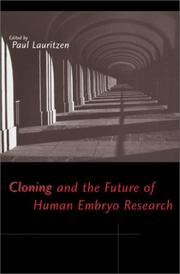
ISBN: 0195128583 9780195128581 Year: 2000 Publisher: Oxford Oxford university press
Abstract | Keywords | Export | Availability | Bookmark
 Loading...
Loading...Choose an application
- Reference Manager
- EndNote
- RefWorks (Direct export to RefWorks)
Medical law --- Professional ethics. Deontology --- Human cloning --- -Assisted human reproduction --- Human reproductive technology --- Human embryo --- Moral and ethical aspects --- Research --- Embryo, Human --- Research&delete& --- Embryology, Human --- Human reproductive technology - Moral and ethical aspects --- Human embryo - Research - Moral and ethical aspects --- Human cloning - Moral and ethical aspects
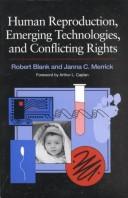
ISBN: 0871879387 9780871879387 Year: 1995 Publisher: Washington (D.C.) CQ press
Abstract | Keywords | Export | Availability | Bookmark
 Loading...
Loading...Choose an application
- Reference Manager
- EndNote
- RefWorks (Direct export to RefWorks)
Human reproductive technology --- Moral and ethical aspects. --- Government policy. --- #SBIB:314H232 --- #SBIB:316.356.2H3660 --- Assisted conception --- Assisted human reproduction --- Assisted human reproductive technology --- Conception --- Human assisted reproduction --- Human assisted reproductive technology --- Human reproduction --- Medical technology --- Reproductive technology --- Government policy --- Moral and ethical aspects --- Vruchtbaarheid --- Gezinssociologie: vruchtbaarheidstechnieken en draagmoederschap --- Technological innovations --- Human reproductive technology - Moral and ethical aspects. --- Human reproductive technology - Government policy.
Book
ISBN: 3119162825 3110240203 9783110240207 9783110240214 3110240211 1283399644 9786613399649 9781283399647 6613399647 Year: 2011 Publisher: Berlin ; Boston : De Gruyter,
Abstract | Keywords | Export | Availability | Bookmark
 Loading...
Loading...Choose an application
- Reference Manager
- EndNote
- RefWorks (Direct export to RefWorks)
Assisted reproductive technologies (ART) include the artificial or partially artificial methods to achieve pregnancy. These new technologies lead to substantial changes regarding of ethical and legal aspects in reproductive medicine. The book focuses on current hot topics about ethical dilemmas in ART, e.g. about the duties of ethical committees, guidelines regarding informed consent, ethical and legal aspects of sperm donation, embryo donation, ethics of embryonic stem cells, therapeutical cloning, patenting of human genes, commercialization.
Bioethical Issues. --- Human reproductive technology - Moral and ethical aspects. --- Human reproductive technology -- Moral and ethical aspects. --- Reproductive Techniques, Assisted - ethics. --- Reproductive Techniques, Assisted -- ethics. --- Women’s Rights. --- Women's Rights. --- Human reproductive technology --- Morals --- Reproductive Techniques --- Human Rights --- Humanities --- Therapeutics --- Social Control, Formal --- Investigative Techniques --- Psychology, Social --- Sociology --- Analytical, Diagnostic and Therapeutic Techniques and Equipment --- Behavior and Behavior Mechanisms --- Health Care Economics and Organizations --- Psychiatry and Psychology --- Social Sciences --- Health Care --- Anthropology, Education, Sociology and Social Phenomena --- Reproductive Techniques, Assisted --- Ethics --- Bioethical Issues --- Women's Rights --- Medicine --- Health & Biological Sciences --- Gynecology & Obstetrics --- Moral and ethical aspects --- 241.64*8 --- Theologische ethiek: kunstmatige inseminatie; leenmoederschap --- Moral and ethical aspects. --- ethics. --- 241.64*8 Theologische ethiek: kunstmatige inseminatie; leenmoederschap --- Ethics. --- Pregnancy. --- Reproductive Medicine. --- Reproductive Technologies.
| Listing 1 - 10 of 44 | << page >> |
Sort by
|

 Search
Search Feedback
Feedback About
About Help
Help News
News